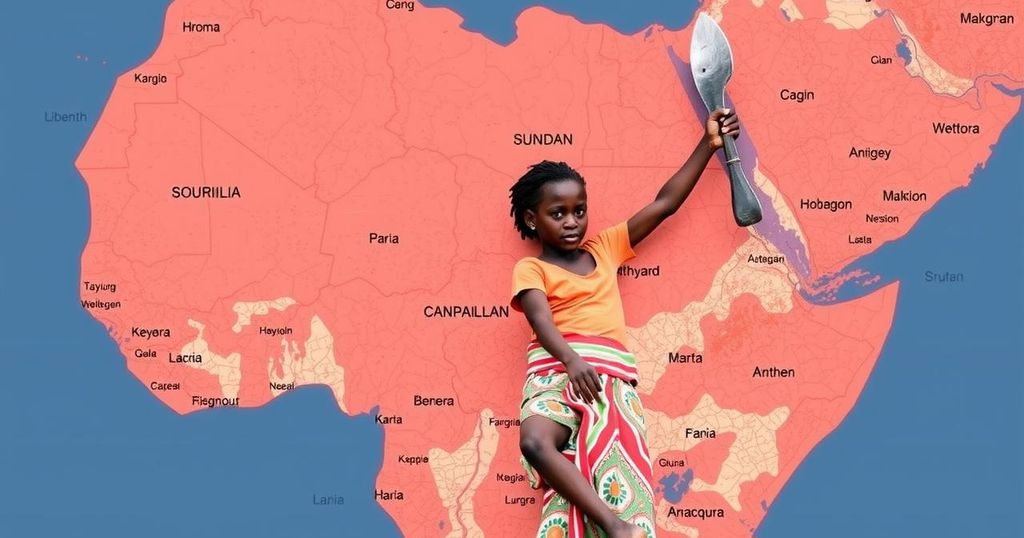Humanitarian Needs in South Sudan: Challenges and Responses for 2025

The humanitarian crisis in South Sudan is critical, marked by ongoing violence, insecurity, and extreme climatic events like flooding and droughts. Over 901,000 refugees have entered from Sudan, straining resources, while public health systems remain fragile, impacting disease response efforts. Women and girls face heightened risks, necessitating urgent and coordinated humanitarian interventions.
The humanitarian crisis in South Sudan remains severe as the country grapples with ongoing armed conflict, food insecurity, public health challenges, and extreme climatic events. Over a decade post-independence, many South Sudanese continue to face dire conditions enhanced by the economic downturn, the conflict in neighboring Sudan, and persistent flooding that has aggravated living conditions amid a fragile healthcare system. With significant vulnerabilities for women and girls, the situation calls for urgent international response and expanded humanitarian aid services, particularly as the country braces for continued climate-related challenges and the aftermath of regional instability.
Climate shocks have made South Sudan the world’s second most vulnerable nation to natural disasters, as reported by the 2024 INFORM Risk Index. Frequent and intense flooding has displaced communities and compromised their livelihoods; recent floods affected 1.4 million individuals, many still recovering from previous disasters. Concurrently, drought affects a substantial portion of the population, leading to heightened food insecurity and induced displacements. Such climatic extremes underline the urgent need for a multifaceted response strategy to restore resilience within these communities.
Persistent conflicts further complicate the humanitarian landscape, with intercommunal violence escalating despite a formal peace agreement. Violence driven by resource scarcity and cultural tensions remains prevalent, resulting in numerous casualties and exacerbating the already dire human rights situation. The United Nations documented over a thousand victims of violence in just the second quarter of 2024. This ongoing instability poses significant challenges for humanitarian operations and overall community stability, impeding the delivery of essential aid.
The conflict in Sudan has precipitated a significant influx of Sudanese refugees into South Sudan, overwhelming already strained resources. With the number of refugees exceeding 901,000 by late 2024, the local infrastructure struggles to accommodate the needs of both refugees and host communities. Urgent life-saving assistance in food, shelter, healthcare, and sanitation is crucial to mitigate the worsening conditions as integration challenges for returnees are compounded by food insecurity and limited access to services.
Public health issues are rampant in South Sudan, worsened by disrupted immunization efforts and the influx of displaced individuals. The fragile healthcare system, heavily reliant on humanitarian support and severely underfunded, remains ill-equipped to handle multiple disease outbreaks, including a resurgence of cholera and malaria, which continues to afflict a large segment of the population. Timely intervention and enhanced healthcare service delivery are essential to address the rising disease burden and prevent further health crises.
South Sudan, the world’s youngest nation, has endured continual humanitarian crises since its independence. The combination of systemic violence, economic downturns, and extreme climate events has disrupted public services and magnified the population’s vulnerabilities over the past decade. Additionally, the spillover effects from regional conflicts, particularly from neighboring Sudan, are further straining local resources, exacerbating food insecurity, and challenging existing humanitarian frameworks. The ongoing interplay among these factors underscores the urgency for dedicated international support and a comprehensive approach to address the multifaceted needs of the South Sudanese population.
In conclusion, the humanitarian situation in South Sudan requires an urgent and coordinated international response to alleviate the pervasive security challenges, public health crises, and humanitarian needs exacerbated by climatic shocks and regional conflicts. Significant investments in infrastructure, healthcare, and community resilience are indispensable to improve conditions and ensure that vulnerable populations can recover and thrive amidst persistent adversities. Immediate actions are necessary to support both current and incoming communities while addressing the systemic issues that perpetuate this crisis.
Original Source: www.unocha.org






